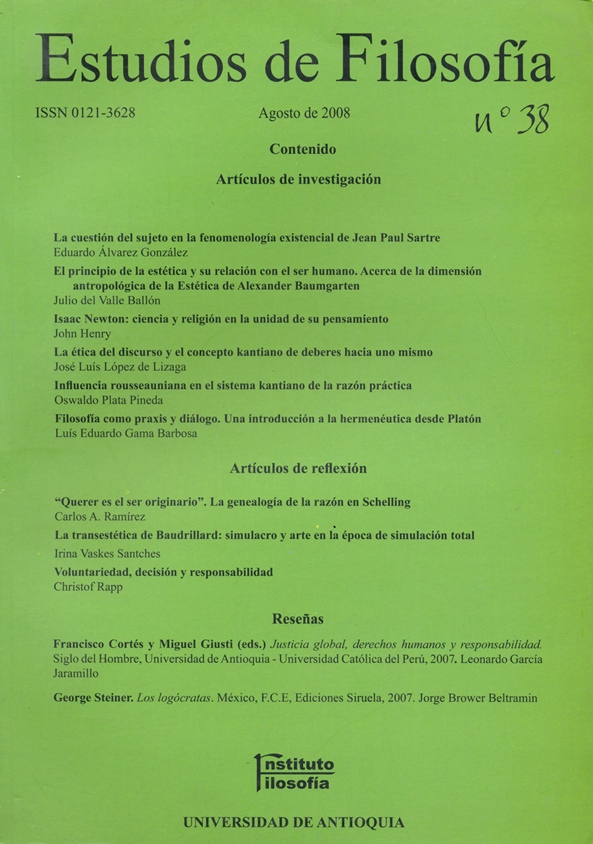Philosophy as Praxis and Dialogue [An Introduction to Hermeneutics since Plato]
DOI:
https://doi.org/10.17533/udea.ef.12701Keywords:
Reminiscence, History, Praxis, Hermeneutics, LanguageAbstract
Philosophy, more than being a task that aims at creating and establishing an Absolute Theory of Truth, as was the case in the History of Philosophy itself of Cartesian thought, Hegelian thought, Husserlian thought, is among other things, an activity, that is, a Dialogic Praxis which is to be understood as an insertion in the middle of a road which others have already traveled, and this presupposes, immediately, a conception of Philosophy as a road of experience that is always open. Thus, the present article analyzes Philosophical work as a hermeneutical practice that is not only presented as a familiarization with tradition (the example of which is given by using the Platonic Theory of Reminiscence) but also as an inherent break with the said familiarization. Therefore, the article tries to present Philosophical Knowledge and Philosophical Work from a hermeneutical point of view, which as such entails conceiving them as a Dialogic Action through which the Philosophical Work is stimulated as Remembrance, that is, not just as a mere apprehension of concepts or as an establishment of adding up truths, but instead as a Human Praxis, were Philosophy and Hermeneutical Experience nd their true topos.
Downloads
References
BAKER, J.M. Lyric as Paradigm: Hermeneutics and the Speculative Instance of Poetry in Gadamer’s Hermeneutic, en: Dostal, R. (Ed.), The Cambridge Companion to Gadamer, Cambridge, 2002. DOI: https://doi.org/10.1017/CCOL0521801931.008
BOSTOCK, D. Plato’s Phaedo.Clarendon, Oxford, 1986.
DONALD, D. “Gadamer and Plato’s ‘Philebus’”, en: L.E. Hahn (ed.). The Philosophy of Hans-Georg Gadamer, Chicago/ La Salle. Library of livingPhilosophers 24, Open Court, 1997
FIGAL, G. Philosophische Hermeneutik – hermeneutische Philosophie. Ein Problemaufriss, en: Figal, G., Grondin, J., Schmidt, D. (eds.), Hermeneutische Wege: Hans-Georg Gadamer zum Hundersten, Tübingen, Mohr Siebeck, 2000.
GADAMER, H-G. Antología. Trad. de Constantino Ruiz-Garrido, Sígueme, Salamanca, 2001.
GADAMER, H-G. Verdad y Método, Tomo I. Trad. de Ana Agud y Rafael de Agapito. Sígueme, Salamanca, 1977.
GADAMER, H-G. Die Idee des Guten zwischen Platon und Aristoteles. En: Gesammelle Werke, Bd. 7.
GADAMER, H-G. Gesammelte Werke, Bd.1. Mohr Siebeck, Tübingen, 1990.
GADAMER, H-G. Hermeneutik und ontologische Differenz, en: Gesammelte Werke, Bd. 10. Mohr Siebeck, Tübingen.
GADAMER, H-G. Koselleck, R. Hermeneutik und Historik. Sitzungsberichte der Heidelberger Akademie der Wissenschaften, Heidelberg, 1997.
GADAMER, H-G. Selbstdarstellung, en: Gesammelte Werke , Bd. 2.
GADAMER, H-G. Unterwegs zur Schrift?, en: Gesammelte Werke, Bd. 7, Mohr Siebeck, Tübingen, 1999.
HEIDEGGER, M. Ontología. Hermenéutica de la facticidad. Trad. de Jaime Aspiunza. Alianza ed., Madrid, 1999.
HEIDEGGER, M. Ontologie (Hermeneutik der Faktizität), Gesamtausgabe, Bd. 63, Vittorio Klostermann, Frankfurt a.M., 1982
HEIDEGGER, M. Phänomenologische Interpretationen zu Aristoteles. Reclam, Stuttgart, 2002.
HEIDEGGER, M. Sein und Zeit. Max Niemeyer Verlag, Tübingen, 1993.
JAMME, Ch. Heideggers frühe Begründung der Hermeneutik, en: Dilthey- Jahrbuch für Philosophie und Geschichte der Geisteswissenschaften<, Band 4, 1986-87. DOI: https://doi.org/10.5840/dj1986-8745
PLATÓN. Diálogos. Tomo II. Trad. F.J. Olivieri. Gredos, Madrid, 1983.
PLATÓN. Diálogos. Tomo III. Trad. de Carlos García Gual. Gredos, Madrid, 1986.
PLATÓN. Phédon. Trad. de Monique Dixsaut. GF Flammarion, No. 489, París, 1991.
RENAUD, F. Die Resokratisierung Platons. Academia, Sankt Augustin, 1999.
RISSER, J. “Gadamer’s Plato and the Task of the Philosophy”, en: M. Wischke, M. Hofer (ed.). Gadamer Verstehen/ Understanding Gadamer. Wissenschaftliche Buchgesellschaft, Darmstadt, 2003.
RISSER, J. Hermeneutics and the Voice of the Other. SUNY Series, New York, 1997.
STEINMANN, M. Auf den Weg zu einer modernen Epistemolo- gie, en: G. Figal (Hrsg.), H.G. Gadamer. Wahrheit und Methode, Klassiker Auslegen Bd. 30, Akademie Verlag, Berlin 2007.
TEICHERT, D. Erfahrung, Erinnerung, Erkenntnis.Untersuchungen zum Wahrheitsbegriff der Hermeneutik Gadamers. Metzler, Stuttgart, 1991. DOI: https://doi.org/10.1007/978-3-476-03348-2
WISCHKE, M. Die Schwächeder Schrift: zur philosophischen Hermeneutik Hans-Georg Gadamers. Böhlau, Köln, 2000.
WRIGHT, K., Gadamer: The speculative structure of language, en: Wachterhauser, B. (ed.), Hermeneutic and modern philosophy, SUNY, 1986.
Downloads
Published
How to Cite
Issue
Section
Categories
License
Copyright (c) 2008 Luis Eduardo Gama Barbosa

This work is licensed under a Creative Commons Attribution-NonCommercial-ShareAlike 4.0 International License.
Authors who publish with this journal agree to the following terms:
1. The Author retains copyright in the Work, where the term "Work" shall include all digital objects that may result in subsequent electronic publication or distribution.
2. Upon acceptance of the Work, the author shall grant to the Publisher the right of first publication of the Work.
3. The Author shall grant to the Publisher a nonexclusive perpetual right and license to publish, archive, and make accessible the Work in whole or in part in all forms of media now or hereafter known under a Creative Commons Attribution-NoCommercia-ShareAlike (CC BY-NC-SA 4.0), or its equivalent, which, for the avoidance of doubt, allows others to copy, distribute, and transmit the Work under the following conditions: (a) Attribution: Other users must attribute the Work in the manner specified by the author as indicated on the journal Web site;(b) Noncommercial: Other users (including Publisher) may not use this Work for commercial purposes;
4. The Author is able to enter into separate, additional contractual arrangements for the nonexclusive distribution of the journal's published version of the Work (e.g., post it to an institutional repository or publish it in a book), as long as there is provided in the document an acknowledgement of its initial publication in this journal;
5. Authors are permitted, and Estudios de Filosofía promotes, to post online the preprint manuscript of the Work in institutional repositories or on their Websites prior to and during the submission process, as it can lead to productive exchanges, as well as earlier and greater citation of published work (see The Effect of Open Access). Any such posting made before acceptance and publication of the Work is expected be updated upon publication to include a reference to the Estudios de Filosofía's assigned URL to the Article and its final published version in Estudios de Filosofía.















